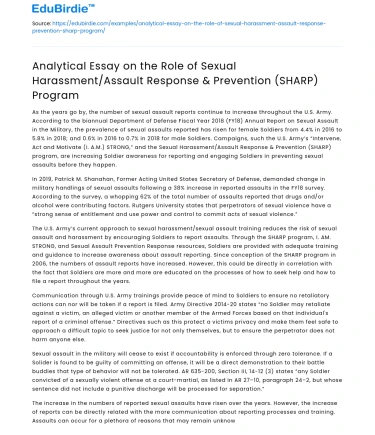As the years go by, the number of sexual assault reports continue to increase throughout the U.S. Army. According to the biannual Department of Defense Fiscal Year 2018 (FY18) Annual Report on Sexual Assault in the Military, the prevalence of sexual assaults reported has risen for female Soldiers from 4.4% in 2016 to 5.8% in 2018; and 0.6% in 2016 to 0.7% in 2018 for male Soldiers. Campaigns, such the U.S. Army’s “Intervene, Act and Motivate (I. A.M.) STRONG,” and the Sexual Harassment/Assault Response & Prevention (SHARP) program, are increasing Soldier awareness for reporting and engaging Soldiers in preventing sexual assaults before they happen.
In 2019, Patrick M. Shanahan, Former Acting United States Secretary of Defense, demanded change in military handlings of sexual assaults following a 38% increase in reported assaults in the FY18 survey. According to the survey, a whopping 62% of the total number of assaults reported that drugs and/or alcohol were contributing factors. Rutgers University states that perpetrators of sexual violence have a “strong sense of entitlement and use power and control to commit acts of sexual violence.”
Save your time!
We can take care of your essay
- Proper editing and formatting
- Free revision, title page, and bibliography
- Flexible prices and money-back guarantee
The U.S. Army’s current approach to sexual harassment/sexual assault training reduces the risk of sexual assault and harassment by encouraging Soldiers to report assaults. Through the SHARP program, I. AM. STRONG, and Sexual Assault Prevention Response resources, Soldiers are provided with adequate training and guidance to increase awareness about assault reporting. Since conception of the SHARP program in 2006, the numbers of assault reports have increased. However, this could be directly in correlation with the fact that Soldiers are more and more are educated on the processes of how to seek help and how to file a report throughout the years.
Communication through U.S. Army trainings provide peace of mind to Soldiers to ensure no retaliatory actions can nor will be taken if a report is filed. Army Directive 2014-20 states “no Soldier may retaliate against a victim, an alleged victim or another member of the Armed Forces based on that individual's report of a criminal offense.” Directives such as this protect a victims privacy and make them feel safe to approach a difficult topic to seek justice for not only themselves, but to ensure the perpetrator does not harm anyone else.
Sexual assault in the military will cease to exist if accountability is enforced through zero tolerance. If a Solider is found to be guilty of committing an offense, it will be a direct demonstration to their battle buddies that type of behavior will not be tolerated. AR 635-200, Section III, 14-12 (3) states “any Soldier convicted of a sexually violent offense at a court-martial, as listed in AR 27–10, paragraph 24–2, but whose sentence did not include a punitive discharge will be processed for separation.”
The increase in the numbers of reported sexual assaults have risen over the years. However, the increase of reports can be directly related with the more communication about reporting processes and training. Assaults can occur for a plethora of reasons that may remain unknown, but as long as the reporting process is consistently communicated and assaults will not be tolerated, the number of assaults will likely decrease over time. We are one team, one fight. We must intervene, act, and motivate one another to ensure our battle buddies are taken care of and informed.






 Stuck on your essay?
Stuck on your essay?

